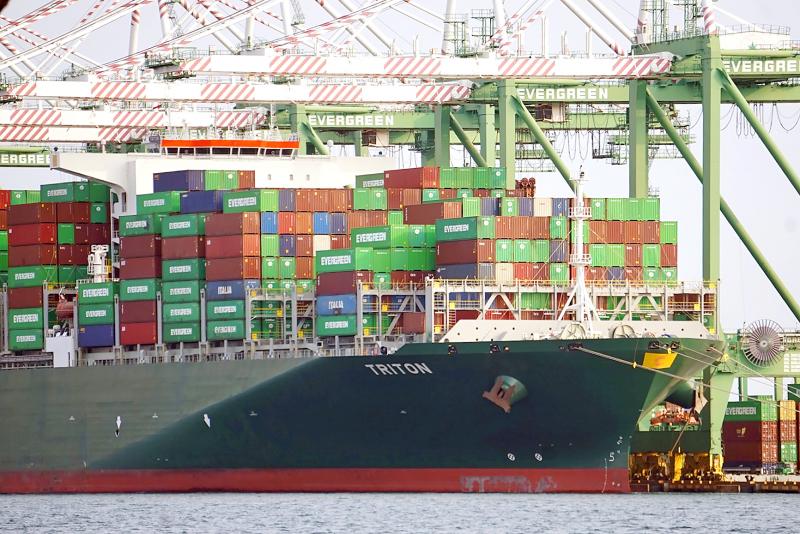Taiwan’s trade surplus should hit a new high above US$70 billion this year, largely because of ongoing robust global demand for semiconductors, the Ministry of Finance said on Tuesday.
Taiwan’s largest trade surplus to date was recorded last year at US$64.9 billion from growth in the electronic component industry, including semiconductor suppliers, the ministry said in a report.
The uptrend seen in the industry is expected to continue this year and push the trade surplus to another new high, the ministry said.

Photo: CNA
The importance of that product category was seen in Taiwan’s overall trade last year with China, including Hong Kong.
China has been Taiwan’s largest export market and its biggest import source since 2013. Taiwan’s trade surplus with the Chinese market has surged in the past few years, reaching a high of US$104.7 billion last year, the ministry said.
Given that many Taiwanese electronics companies have operations in China, the surplus in electronic components totaled US$79.4 billion last year, accounting for about 76 percent of the total.
Supporting the strong showing has been an effort by leading Taiwanese semiconductor companies to localize the supply chain, which has bolstered Taiwan’s position in the global market, the ministry said.
Taiwan’s second-largest trade surplus last year was with the US, totaling a record US$26.5 billion, as trade tensions between Washington and Beijing prompted US buyers to shift their orders to Taiwanese exporters, it said.
The US was the largest source of Taiwan’s trade surplus in information and communications technology, as well as audio and video devices, the ministry said.
The surpluses with China and the US reflect Taiwan’s comprehensive semiconductor sector and strength in technology development, the report said, adding that China and the US are likely to remain the two top sources of Taiwan’s trade surplus this year.

‘SWASTICAR’: Tesla CEO Elon Musk’s close association with Donald Trump has prompted opponents to brand him a ‘Nazi’ and resulted in a dramatic drop in sales Demonstrators descended on Tesla Inc dealerships across the US, and in Europe and Canada on Saturday to protest company chief Elon Musk, who has amassed extraordinary power as a top adviser to US President Donald Trump. Waving signs with messages such as “Musk is stealing our money” and “Reclaim our country,” the protests largely took place peacefully following fiery episodes of vandalism on Tesla vehicles, dealerships and other facilities in recent weeks that US officials have denounced as terrorism. Hundreds rallied on Saturday outside the Tesla dealership in Manhattan. Some blasted Musk, the world’s richest man, while others demanded the shuttering of his

TIGHT-LIPPED: UMC said it had no merger plans at the moment, after Nikkei Asia reported that the firm and GlobalFoundries were considering restarting merger talks United Microelectronics Corp (UMC, 聯電), the world’s No. 4 contract chipmaker, yesterday launched a new US$5 billion 12-inch chip factory in Singapore as part of its latest effort to diversify its manufacturing footprint amid growing geopolitical risks. The new factory, adjacent to UMC’s existing Singapore fab in the Pasir Res Wafer Fab Park, is scheduled to enter volume production next year, utilizing mature 22-nanometer and 28-nanometer process technologies, UMC said in a statement. The company plans to invest US$5 billion during the first phase of the new fab, which would have an installed capacity of 30,000 12-inch wafers per month, it said. The

MULTIFACETED: A task force has analyzed possible scenarios and created responses to assist domestic industries in dealing with US tariffs, the economics minister said The Executive Yuan is tomorrow to announce countermeasures to US President Donald Trump’s planned reciprocal tariffs, although the details of the plan would not be made public until Monday next week, Minister of Economic Affairs J.W. Kuo (郭智輝) said yesterday. The Cabinet established an economic and trade task force in November last year to deal with US trade and tariff related issues, Kuo told reporters outside the legislature in Taipei. The task force has been analyzing and evaluating all kinds of scenarios to identify suitable responses and determine how best to assist domestic industries in managing the effects of Trump’s tariffs, he

Taiwan’s official purchasing managers’ index (PMI) last month rose 0.2 percentage points to 54.2, in a second consecutive month of expansion, thanks to front-loading demand intended to avoid potential US tariff hikes, the Chung-Hua Institution for Economic Research (CIER, 中華經濟研究院) said yesterday. While short-term demand appeared robust, uncertainties rose due to US President Donald Trump’s unpredictable trade policy, CIER president Lien Hsien-ming (連賢明) told a news conference in Taipei. Taiwan’s economy this year would be characterized by high-level fluctuations and the volatility would be wilder than most expect, Lien said Demand for electronics, particularly semiconductors, continues to benefit from US technology giants’ effort